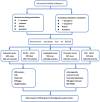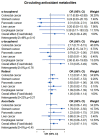Diet-Derived Circulating Antioxidants and Risk of Digestive System Tumors: A Mendelian Randomization Study
- PMID: 36014780
- PMCID: PMC9413447
- DOI: 10.3390/nu14163274
Diet-Derived Circulating Antioxidants and Risk of Digestive System Tumors: A Mendelian Randomization Study
Abstract
Previous observational case-control studies have shown significant controversy over the impact of dietary intake-related circulating antioxidants on the risk of digestive system tumors. We conducted a two-sample Mendelian randomized (MR) analysis to determine whether there was a significant causal relationship between increased levels of circulating antioxidants and digestive system tumors. Our circulating antioxidants (vitamin C, carotenoids, vitamin A, and vitamin E) were derived from absolute circulating antioxidants and circulating antioxidant metabolites, and their corresponding instrumental variables were screened from published studies. The digestive system tumors we studied included colorectal, gastric, pancreatic, liver, and esophageal cancer, and the corresponding summary GAWS (genome-wide association study) data were obtained from the UK Biobank database. We first evaluated the causal relationship between each tumor and circulating antioxidants and then used meta-analysis to summarize the results of MR analysis of different tumors. No significant associations were noted for genetically predicted circulating antioxidants and higher risk of digestive system tumors in our study. The pooled ORs (odds ratio) are 0.72 (95% CI: 0.46-1.11; β-carotene), 0.93 (95% CI: 0.81-1.08; lycopene), 2.12 (95% CI: 0.31-14.66; retinol), and 0.99 (95% CI: 0.96-1.02; ascorbate) for absolute circulating antioxidants; for circulating antioxidant metabolites, the pooled ORs for digestive system tumors risk per unit increase of antioxidants were 1.29 (95% CI: 0.39-4.28; α-tocopherol), 1.72 (95% CI: 0.85-3.49; γ-tocopherol), 1.05 (95% CI: 0.96-1.14; retinol), and 1.21 (95% CI: 0.97-1.51; ascorbate), respectively. Our study suggested that increased levels of dietary-derived circulating antioxidants did not reduce the risk of digestive system tumors.
Keywords: circulating antioxidants; digestive system tumors; mendelian randomization.
Conflict of interest statement
The authors declare no competing interests.
Figures
References
-
- Wang H., Naghavi M., Allen C., Barber R.M., Bhutta Z.A., Carter A., Casey D.C., Charlson F.J., Chen A.Z., Coates M.M., et al. Global, regional, and national life expectancy, all-cause mortality, and cause-specific mortality for 249 causes of death, 1980–2015: A systematic analysis for the Global Burden of Disease Study 2015. Lancet. 2016;388:1459–1544. doi: 10.1016/S0140-6736(16)31012-1. - DOI - PMC - PubMed
-
- Islami F., Goding Sauer A., Miller K.D., Siegel R.L., Fedewa S.A., Jacobs E.J., McCullough M.L., Patel A.V. Proportion and number of cancer cases and deaths attributable to potentially modifiable risk factors in the United States. CA Cancer J. Clin. 2018;68:31–54. doi: 10.3322/caac.21440. - DOI - PubMed
-
- Carini F., Mazzola M., Rappa F., Jurjus A., Geagea A.G., Al Kattar S., Bou-Assi T., Jurjus R. Colorectal Carcinogenesis: Role of Oxidative Stress and Antioxidants. Anticancer Res. 2017;37:4759–4766. - PubMed
Publication types
MeSH terms
Substances
Grants and funding
LinkOut - more resources
Full Text Sources




